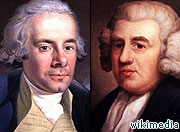Today, 225 years ago, one of the most important conversations in British history took place. It was between the young politician, William Wilberforce, and the evangelical minister, John Newton.
Watch the video
Wilberforce had recently become a Christian and was considering going into the pastoral ministry, as many evangelicals felt that politics was no place for a Christian.
Turmoil
The young Wilberforce was in turmoil over what he should do: give up his political career and all that went with it and be shunned by his contemporaries? Or stay in politics and face the disapproval of his new Christian friends?
He therefore sought the advice of John Newton, the former slave trader, who had been dramatically converted to Christ and had himself entered the Anglican ministry.
Amazing grace
Newton is most famous for having penned the great hymn Amazing Grace, the name recently given to a film about Wilberforce, in which Newton is played by the actor Albert Finney.
After arranging to visit him, Wilberforce walked twice around the square before summoning up the courage to knock on the door at Newton’s house.
Although the film’s portrayal is not accurate in every detail, Newton did know Wilberforce from childhood and the meeting did in fact take place. Newton wisely encouraged the young Wilberforce to stay in politics and serve God there, with all the abilities and influences that he clearly had.
Blessing
Newton later wrote to Wilberforce: “It is hoped and believed that the Lord has raised you up for the good of His church and for the good of the nation.”
He also wrote of Wilberforce to his good friend and fellow hymnwriter William Cowper: “I hope the Lord will make him a blessing both as a Christian and as a statesman. How seldom do these characters coincide! But they are not incompatible.”
Slavery abolished
William Wilberforce went on to show how true that last statement was, as he spent the remainder of his life seeking to transform society through distinctively Christian political involvement.
For many years, his was almost a lone voice in Parliament against slavery, yet it won through in the end.
And here in the UK we have recently celebrated the 200th anniversary of the abolition of the slave trade.
Reforms
Wilberforce brought about many other enduring reforms and helped shape our modern concept of social responsibility.
Just three days before his death in 1833, he learned that the Bill for abolishing slavery throughout the British Empire was set to be passed by Parliament.
Lessons
What then are the lessons for Christians today from that life-changing conversation between Wilberforce and Newton?
First of all, it shows that the pastoral ministry, vitally important though it is, is not the only way Christians can serve God effectively.
Secondly, it shows us all, especially pastors, how influential our words can be under God when we counsel others.
And finally, it shows us what can still be achieved by Christians through political involvement, influencing our society for good and being salt and light, as Jesus commanded.
Godly influence
Sadly, some Christians believe that it is wrong to become involved politically at all. Yet the Bible is full of characters who did – Joseph, Daniel and Nehemiah, to name but three – and it teaches us to seek the peace and prosperity of our society, no matter how godless it may be.
History has shown that John Newton’s advice was not only sound but was used by God to bring about lasting good in our nation and throughout the world. May it encourage us, 225 years on, to be a godly influence in whatever way we can, for the good of His church and also for the good of the nation.

